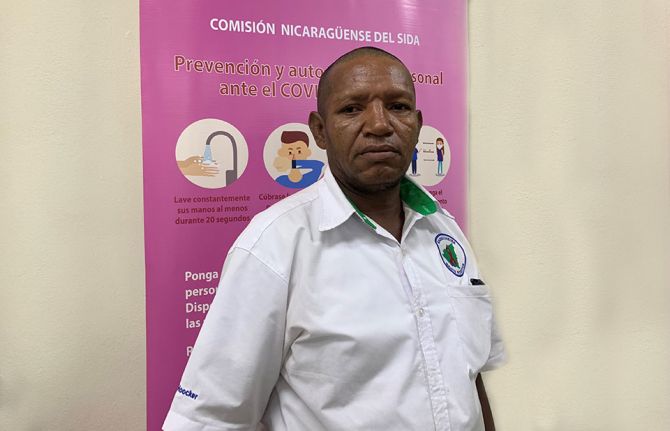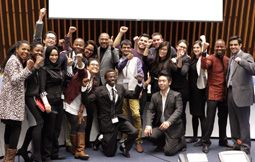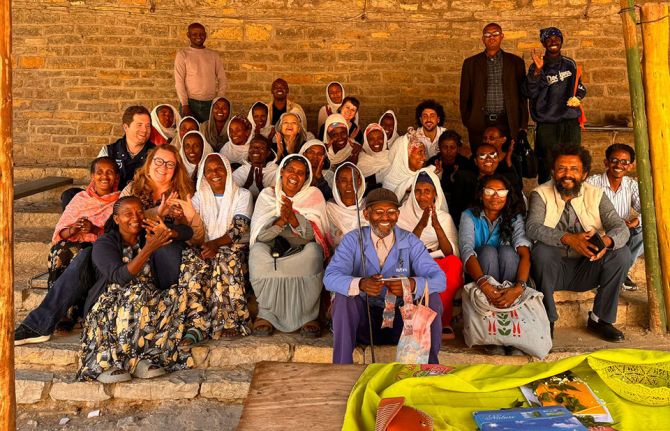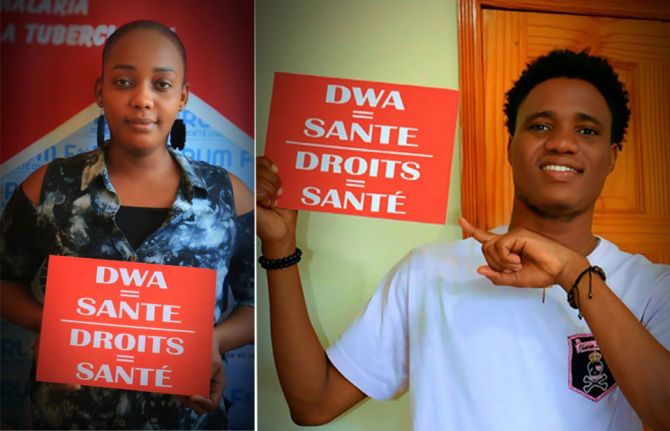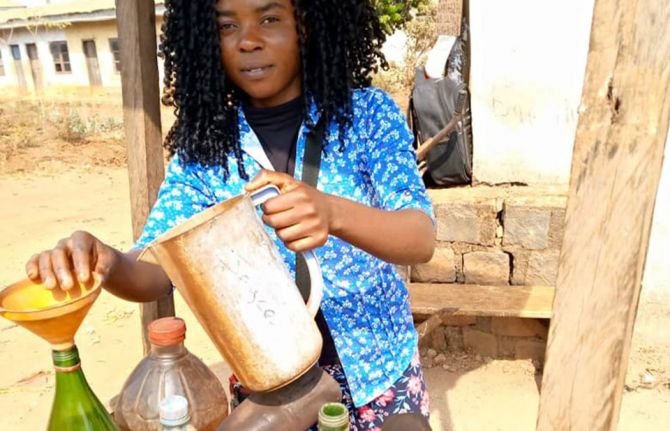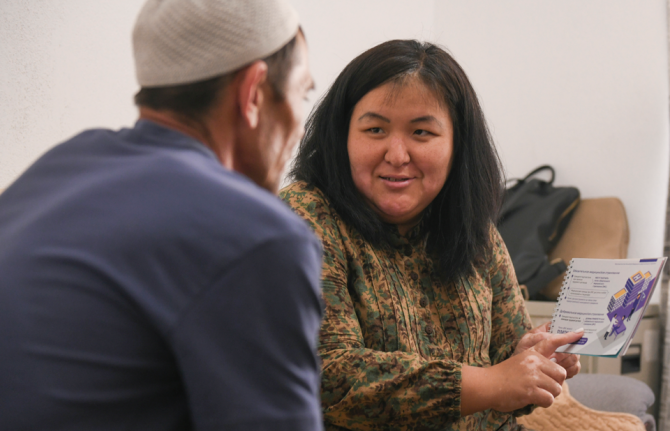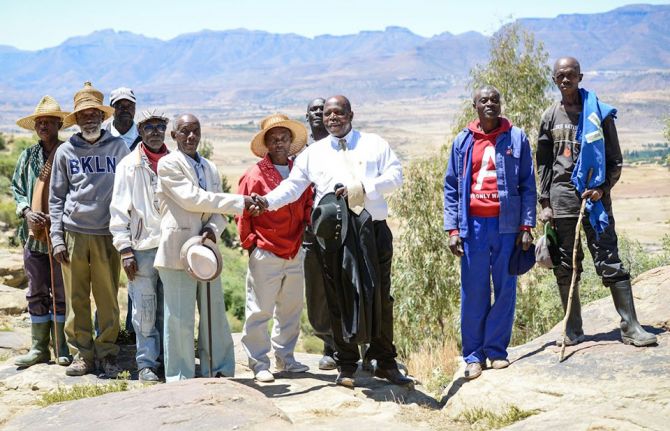
Feature Story
International Day of the World's Indigenous People focuses on AIDS
11 August 2009
11 August 2009 11 August 2009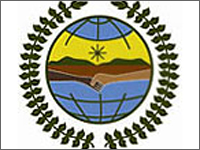
The 2009 International Day of the World's Indigenous People was observed at the United Nations Headquarters on Monday 10 August 2009. This year’s International Day focused on the theme of “Indigenous Peoples and HIV/AIDS”. The Deputy Secretary-General, the President of the General Assembly, the Under-Secretary-General for Economic and Social Affairs, the Chairperson of the UN Permanent Forum on Indigenous Issues, the Director of the UNAIDS New York Office and other officials participated in the observing event.
In his message, the Secretary-General emphasized that it was essential that “indigenous peoples have access to the information and infrastructure necessary for detection, treatment and protection”. He noted that indigenous peoples “tend to suffer from the low standards of health”, which is perpetuating the gap in many countries between the recognition of their rights and the actual situation on the ground. The Secretary-General called on Governments and civil society “to act with urgency and determination to close this implementation gap, in full partnership with indigenous peoples.”
Bertil Lindblad, Director, UNAIDS New York Office, noted the “natural synergy and potential for collaboration between the AIDS response and the indigenous movement. Both are grounded in human rights and also share the principle of the meaningful participation of communities: people living with HIV and indigenous people, respectively. For years, AIDS activism has been a voice of the voiceless, by highlighting social and economic injustices, violations of rights of vulnerable and marginalized groups, and by engaging those living with and affected by HIV in developing the response to the epidemic, which goes beyond the health sector alone. In joining the common cause with indigenous peoples, we can help achieve better social and economic equity to enable thousands of people to live in health and dignity.”
The observance ceremony was organized by the Secretariat of the United Nations Permanent Forum on Indigenous Issues in cooperation with the NGO Committee on the International Decade of the World's Indigenous Peoples. Bertil Lindblad, Director, UNAIDS New York Office participated at the ceremony and the following panel discussion.
International Day of the World's Indigenous Peopl
Press centre:
Message of the Secretary-General
Speeches:
Read speech by Bertil Lindblad, Director, UNAIDS New York Office. speech
External links:
Permanent Forum on Indigenous Issues
2009 International Day of the World's Indigenous People
Publications:
UNAIDS Report to the UN Permanent Forum on Indigenous Issues for the fifth session of the forum (May 2006) (pdf, 92 Kb.)
Related
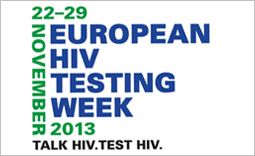 Know your HIV status: First European testing week takes off
Know your HIV status: First European testing week takes off

27 November 2013

Feature Story
WFP Addresses Vital Role of Food and Nutrition in Global AIDS Response
11 August 2009
11 August 2009 11 August 2009
The United Nations World Food Programme (WFP) and its partners explored the vital role of nutrition and food security for people living with HIV during a satellite session at ICAAP09. Credit: WFP/Jim Holmes
During a satellite session at the IX International Congress on AIDS in Asia and the Pacific (ICAAP), held in Bali, Indonesia, the United Nations World Food Programme (WFP) and its partners explored the vital role of nutrition and food security for people living with HIV. Participants examined models of integrating this key area into HIV treatment, care and support, as well as implementation opportunities and challenges.
The widespread recognition of food and nutrition as a critical component of the global AIDS response has come after prolonged advocacy by WFP and others. Optimizing the nutritional status of people living with HIV is a scientifically recognized best practice. Without proper nutrition, people living with HIV become malnourished and treatment is less effective. WFP is placing greater emphasis on the integration of nutritional care in the health sector.
Since each country’s HIV epidemic is different, national AIDS responses need to reflect reality and address the context of unique risks and vulnerabilities. For WFP, the UNAIDS advocacy message, “Know your epidemic, know your response” means that national AIDS responses will include a nutrition and food component when appropriate.
In Asia, there are an estimated 5.0 million people living with HIV. Viral transmission focuses on vulnerable populations susceptible to infection such as sex workers or injecting drug users. In this context, WFP’s action on AIDS reflects the epidemic trend with activities such as the inclusion of mitigation and safety nets for these most at risk populations in national action plans and poverty reduction strategies.
Dr Martin W. Bloem, Head of WFP’s Nutrition and HIV/AIDS Policy, led the satellite session, entitled ‘Models for integrating nutrition and food security into HIV treatment, care and support in the Asia region: Opportunities and challenges’. He was joined by three additional speakers: Professor Emeritus Praphan Phanuphak, Director, Thai Red Cross AIDS Research Centre; Dr Angela Kelly, Team Leader, Papua New Guinea Institute of Medical Research; and Ms Kaniz Fatima, Project Officer and HIV Focal Point, WFP Bangladesh.
They shared their expertise and knowledge on the impact of nutrition and food security for people living with the virus; opportunities and challenges related to nutrition programme design and the development of HIV nutrition guidelines; and priorities for future strategies.
WFP Addresses Vital Role of Food and Nutrition in
IX International Congress on AIDS in Asia and the Pacific
Cosponsors:
Feature stories:
African Union summit focuses on economic growth and food security (02 July 2009)
Swaziland: WFP supports families living with HIV (08 June 2009)
HIV and high food prices (01 April 2009)
The impact of nutrition and HIV: World Food Programme (26 November 2008)
New UNAIDS policy on HIV, food security and nutrition (21 May 2008)
Publications:
UNAIDS Policy Brief – HIV, food security and nutrition (pdf, 244 Kb)
UNAIDS Policy Brief – HIV, food security and nutrition (expanded version) (pdf, 247 Kb)
Related

Feature Story
Injecting drug users take central role in anti-stigma film
10 August 2009
10 August 2009 10 August 2009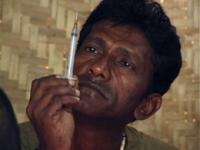
A frame from the film Suee (Needle), unveiled during the satellite session, ‘Reforming treatment environments – How to make compulsory drug treatment HIV friendly’ at ICAAP09.
The lives of injecting drug users and the HIV-related stigma and discrimination they face was one focus of the IX International Congress on AIDS in Asia and the Pacific as the film Suee (Needle) was launched by Response Beyond Borders, the Asian consortium on drug use HIV, AIDS and poverty.
Unveiled during the satellite session, ‘Reforming treatment environments – How to make compulsory drug treatment HIV friendly’, the film gives a voice to this vulnerable group with anti-stigma messages conveyed by the injecting drug users themselves. It was directed by award-winning Indian movie director, author and screen-writer, Sai Paranjpye, who set out to present an uncompromising insight into a world where HIV prevalence is disproportionately high.
Ms Paranjpye, a Cannes Film Festival award winner, worked closely with injecting drug users on Suee and spent time interviewing them on location and involving them as actors in the film. They ‘own’ the project as much as is practically possible. She also consulted a full range of partners and obtained feed back on the script and other help from NGOs working in HIV prevention with injecting drug users, especially Sharan in Delhi and Sankalp in Mumbia. She also received input from the International Center for Research on Women and World Bank teams, among others.
Suee explores a number of areas in the lives of injecting drug users including treatment, care, peer and community support, rehabilitation and the workplace. It is intended to convey messages of hope and not to trigger reactions of pity or fear; empowering the audience by raising awareness and presenting facts in a non-judgmental way. Made for general consumption, the film can also be used in youth campaigns, providing education and information for young people to help prevent HIV and reduce both risk and vulnerability.
The film emerged from the South Asia Region Development Marketplace (SAR DM), an initiative spearheaded by the World Bank. It consists of a competitive grants programme that identifies and supports small scale projects demonstrating an innovative approach to reducing HIV stigma and discrimination in the region. 26 civil society organisations from across South Asia won grants of US$ 40,000 each to bring their ideas to fruition.
Ms Paranjpye has used her SAR DM award to produce not only the Suee film but another, called “The sound of the horn”, which deals with truck drivers.
Stigma and discrimination are seen as major barriers to scaling up HIV prevention services in the region. They marginalise those living with the virus and contribute to their social isolation and rejection. They also discourage vulnerable groups from accessing HIV treatment, care and support services.
It is hoped that Suee, once widely disseminated, will take its place among a range of interventions helping to reduce stigma and discrimination against South Asia’s injecting drug users.
The film was selected by the screening committee of the Congress and will be shown again on August 11.
Note: Partners and sponsors of the South Asia Region Development Marketplace include: UNAIDS, UNICEF, UNODC, UNDP, the Global Fund, the Government of Norway, the International Center for Research on Women, the International Finance Corporation, and the Swedish International Development Cooperation Agency (SIDA)
Injecting drug users take central role in anti-st
IX International Congress on AIDS in Asia and the Pacific
South Asia Region Development Marketplace
Cosponsors:
World Bank
United Nations Children’s Fund
United Nations Office on Drugs and Crime
United Nations Development Programme
Partners:
Sankalp Rehabilitation Trust
Sharan
International Center for Research on Women
The Global Fund to Fight AIDS, Tuberculosis and Malaria
International Finance Corporation
Swedish International Development Cooperation Agency
Feature stories:
Migrant workers and HIV vulnerability in South Asian and South East Asian countries (18 may 2009)
'Never abandon, never give up’: ILO film helps China’s migrant workers challenge AIDS stigma (30 April 2009)
International Harm Reduction conference opens in Bangkok (20 April 2009)
OPINION: HIV and drugs: two epidemics - one combined strategy (20 April 2009)
‘Love and Relationships’: Film festival in Cambodia addresses HIV prevention (06 April 2009)
UNODC and Iran sign agreements to reduce vulnerability of women and Afghan refugees to drugs and HIV (24 March 2009)
Injecting drug use and HIV: Interview with UNAIDS Team Leader, Prevention, Care and Support team (11 march 2009)
OPINION: Silence on harm reduction not an option (11 March 2009)

Feature Story
More needs to be done to help young people most at risk of HIV infection
10 August 2009
10 August 2009 10 August 2009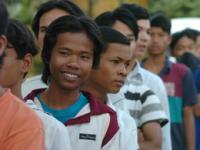
Credit: UNAIDS/O.O'Hanlon
In general, HIV prevention services in the Asia region are currently not reaching young people who are most at risk of infection, which include those who inject drugs, who engage in unprotected male to male sex and those involved in sex work and their clients. In order to address this situation the Asia Pacific Regional UN Coordination Group on Most at Risk Young People hosted a symposium at the IX International Congress on AIDS in Asia and the Pacific.
According to epidemic models presented in the 2008 AIDS in Asia Commission report, over 95% of all new HIV infections in the Asia region occur among such most at risk young populations. However, over 90% of resources for young people as a group are spent on low-risk youth, who represent less than 5% of infections.
Entitled "HIV prevention and most at risk young people", the event was sponsored jointly by UNFPA, UNICEF, UNESCO, UNAIDS, UNDP, WHO and is supported by 7Sisters, the Coalition of Asia Pacific Regional Networks on HIV/AIDS. It examined, among other issues, how the specific needs of most at risk young people should be addressed, what works and what doesn't and how partnerships between youth, NGOs and government can be strengthened.
The symposium discussed the nexus of unsafe sexual behaviours among most at risk young people where a number of such practices coexist in the same environment. Sex work, drug use and unprotected sex with multiple partners can all occur in the same social network. Therefore, participants looked at an approach which addresses a multiplicity of needs, meshing and coordinating previously implemented programmes and ensuring a youth-friendly approach.
A comprehensive, evidence-informed response, it was argued, requires firm commitment from donors and governments to address the specific needs of most at risk young people, and an examination of the contexts in which these risks occur. The engagement of this group in developing the policies, programmes and processes that directly affect and benefit them is seen as a prerequisite. Young people played an active and central role in this event as the practical aspect of exactly how to get youth involved in decision making was explored.
Specific objectives of the meeting also included promoting awareness among policy makers and programme planners on the urgent need for HIV prevention for most at risk young people and encouraging increased collection, analysis and use of data on this key group to support advocacy efforts and inform budget allocation priorities. Sharing experience of programming in this area, both positive and not so positive, was on the agenda too.
Among those taking part in the event were the UNFPA's Deputy Executive Director (Programme), Purnima Mane. UNESCO’s Jan de Lind van Wijngaarden, and UNICEF’s Margaret Sheehan spoke on behalf of the Asia Pacific Regional UN Coordination Group on Most at Risk Young People. James Chau, member of the AIDS2031 initiative, UNAIDS Goodwill Ambassador and Chinese television presenter facilitated the panel discussion. The panel also involved representatives of the medical profession, NGOs, health ministries and representatives of young people involved in sex work, drug use and male to male sex.
More needs to be done to help young people most a
IX International Congress on AIDS in Asia and the Pacific
Cosponsors:
Partners:
7Sisters, the Coalition of Asia Pacific Regional Networks on HIV/AIDS
Feature stories:
International Harm Reduction conference opens in Bangkok (20 April 2009)
OPINION: HIV and drugs: two epidemics - one combined strategy (20 April 2009)
Swing and Sisters: HIV outreach to sex workers in Thailand (19 March 2009)
Injecting drug use and HIV: Interview with UNAIDS Team Leader, Prevention, Care and Support team (11 march 2009)
OPINION: Silence on harm reduction not an option (11 March 2009)
Spotlight: men who have sex with men and HIV (16 February 2009)
Hidden HIV epidemic amongst MSM in Eastern Europe and Central Asia (26 January 2009)
HIV prevention hampered by homophobia (13 January 2009)
Publications:
UNAIDS Action Framework: Universal Access for Men who have Sex with Men and Transgender People (pdf, 323 Kb.)
Framework for monitoring and evaluating prevention programmes for most-at-risk-populations (pdf, 1.49 Mb.)
Policy Brief: HIV and Sex between men (pdf, 277 Kb.)

Feature Story
Hope to reality: transforming the Asia–Pacific AIDS response
10 August 2009
10 August 2009 10 August 2009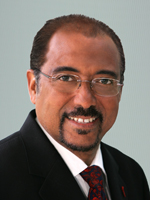
Michel Sidibé, UNAIDS Executive Director
More than a thousand people become infected with HIV in Asia each day. If only we had invested in reaching populations at higher risk and their partners, most of these infections could have been averted - at a cost of less than half a US dollar per person.
We are beginning to see success in some parts of the region, but not enough to break the trajectory of the epidemic.
The Commission on AIDS in Asia has recommended that the AIDS epidemic in the region be redefined. We must transform the AIDS response so that it works for people—especially for those who are marginalized and without a voice. This means protecting sex workers, men who have sex with men, transgender, injecting drug users and women.
How can we do this?
1. Decriminalize consensual adult sexual behaviour and drug use.
2. Address HIV transmission among intimate partners.
3. Invest in evidence-informed HIV prevention, treatment, care and support programmes.
4. Adopt an ‘AIDS plus Millennium Development Goal’ approach.
Decriminalize consensual adult sexual behaviour and drug use
Many countries are changing laws that criminalize consensual adult sexual behaviour (including sex work) and drug use, and courts are helping to clarify bad laws. In Indonesia, the Supreme Court ruled that drug users need care, not prison. In Nepal, the highest court has established that transgender and men who have sex with men have equality under the constitution. And in India, the Delhi High Court has restored dignity to millions, by reading down an archaic law that discriminated against men who have sex with men. New Zealand has legalised sex work and reaped the dual benefits of public health and public safety. Australia has demonstrated that law enforcement and public health goals can go hand in hand while dealing with drug use. We can remove punitive laws and policies that block effective responses to AIDS.
But the real transformation has to be in the hearts and minds of people. Courts and parliaments can only create an enabling environment. Societies and communities have to change the social norms that allow stigma and discrimination.
In India, a pregnant woman was recently branded on her forehead as being HIV positive by hospital staff during a routine check-up. This inhumane treatment of the woman triggered protests by the local community and by human rights activists, which led the Gujarat government to open an investigation. It is this sort of community mobilization that is needed to put an end to such discriminatory acts.
Address HIV transmission among intimate partners
Bad laws and a discriminatory society have had a severe impact on women. Many women in Asia become infected because their husbands or male partners contracted HIV through drug use or through sex with another man or with a sex worker. In India, being monogamous is the only risk factor for an estimated 90% of women living with HIV.
In 2008, 35% of adults living with HIV in Asia were women, and most of them were in steady relationships.
Invest in evidence-informed HIV prevention, treatment, care and support programmes
HIV prevention programmes must be scaled-up. Political leaders must ensure that existing HIV services are expanded to reach the most vulnerable. This includes starting needle exchange programmes and offering oral substation therapy to drug users (great strides in these areas have been made in Bangladesh, China, Malaysia, India and Viet Nam), increasing access to antiretroviral drugs, distributing condoms and offering voluntary HIV counselling and testing services to those at higher risk. It is heartening that requests to the Global Fund to Fight AIDS, Tuberculosis and Malaria for such programmes have increased substantially in recent years. However, we need US$ 7.5 billion in 2010 to reach country targets, but only 10% of this was available in 2007. We must therefore invest wisely and equitably, especially now in the midst of an economic crisis.
Adopt an ‘AIDS plus Millennium Development Goal (MDG)’ approach
Unlike Africa, where the AIDS epidemic can overwhelm development efforts, the Asia and Pacific region can combine development and the AIDS response. Reducing poverty, increasing education and investment in health must become the foundations for sustainable economic growth in the region. This is what I call the ‘AIDS plus MDG’ movement.
Recently I read about Nisha, a person living with HIV in Nepal. She lost her husband in 2004, when there was no access to treatment. Today, she is on antiretroviral therapy. She is staying healthy, has gone back to work and can look after her three children. Her family has come to accept her, and her children go to school, where they are being taught how to protect themselves. Access to treatment has given her an opportunity to fulfil her dreams—this is hope becoming reality.
Hope to reality: transforming the Asia–Pacific AI
Related links:
Speeches:
External links:
Publications:
2008 Report on the global AIDS epidemic
Joint action for results: UNAIDS outcome framework, 2009 – 2011 (pdf, 396 Kb.).
Report of the Commission on AIDS in Asia: Redefining AIDS in Asia: Crafting an effective response (pdf, 1.6 Mb)

Feature Story
"Empowering People, Strengthening Networks" — 9th ICAAP opens
09 August 2009
09 August 2009 09 August 2009
The President of the Republic of Indonesia, H.E. Hj. Dr Susilo Bambang Yudhoyono (right) officially opened the 9th International Congress on AIDS in Asia and the Pacific (ICAAP), which takes place in Bali, Indonesia from 9-13 August. Credit: UNAIDS/Donang Wahyu
The President of the Republic of Indonesia, H.E. Hj. Dr Susilo Bambang Yudhoyono has officially opened the 9th International Congress on AIDS in Asia and the Pacific (ICAAP), which this year takes place in Bali, Indonesia from 9-13 August under the theme “Empowering people, strengthening networks”.
At the opening ceremony, Mr JVR Prasada Rao, Director, UNAIDS Regional Support Team, Asia and the Pacific, has delivered a speech on behalf of UNAIDS Executive Director, Mr Michel Sidibé calling for the establishment of enabling environments and supportive social norms necessary to deliver a future generation free of HIV.
The Congress has drawn thousands of people together for five days of discussion around the AIDS response in the Pacific and across Asia. Together they will discuss a wide range of issues and contexts for the AIDS epidemic in these regions including mobility and migration, injecting drug use, human rights as well as gender.

Mr JVR Prasada Rao, Director, UNAIDS Regional Support Team, Asia and the Pacific delivered a speech during the opening ceremony on behalf of UNAIDS Executive Director, Mr Michel Sidibé. Credit: UNAIDS/Donang Wahyu
According to Mr Rao “There will be evidence-based discussion on whether Universal Access can be an achievable goal by 2010 for many countries in Asia and the Pacific. Every facet of the epidemic and the region’s responses are featured in the wide array of session and activities.”
Mr Rao continued, “What is really impressive is that the conference will showcase the immense progress made by community groups, working together and in partnership with government and other partners, in spearheading the response in many countries in the Asia Pacific region.”
Congress Programme
The event, which takes place every two years, is broad in scope as it includes 24 symposia, 32 skills-building workshops, and 75 satellite meetings. Some 349 abstracts have been accepted by the programme committee for 64 sessions of oral presentations, and 1932 abstracts accepted for poster presentations.
The other main goals of the event are to empower individuals and strengthen networks in the regions to effectively respond to AIDS.
Young people and women
The Bali Youth Force (BYF), a coalition of youth networks and organizations that has collective representation in all Asia & Pacific countries, encouraged significant youth participation in the 9th ICAAP.
UNAIDS Secretariat and its Cosponsors will participate and lead a wide number of events including the launch of a new report, HIV Transmission in Intimate Partner Relationships in Asia, that highlights the increased risk of HIV infection by women engaged in long-term relationships.
HIV epidemic in Asia and Pacific
According to the Independent Commission on AIDS in Asia (2008), AIDS remains the most likely cause of death and loss of work days among people aged 15 to 44.
An estimated 5 million people in Asia were living with HIV in 2007 according to 2008 report on the global AIDS epidemic. The several modes of HIV transmission present in the region, via sex work, injecting drug use, and unprotected sex between men; make Asia’s epidemic one of the most diverse in the world. The Pacific region’s epidemics are relatively small with an estimated 74 000 people living with HIV across Oceania in 2007.
"Empowering People, Strengthening Networks" — 9th
Related links:
Speeches:
External links:
Publications:
2008 Report on the global AIDS epidemic
Joint action for results: UNAIDS outcome framework, 2009 – 2011 (pdf, 396 Kb.).
Report of the Commission on AIDS in Asia: Redefining AIDS in Asia: Crafting an effective response (pdf, 1.6 Mb)
Related
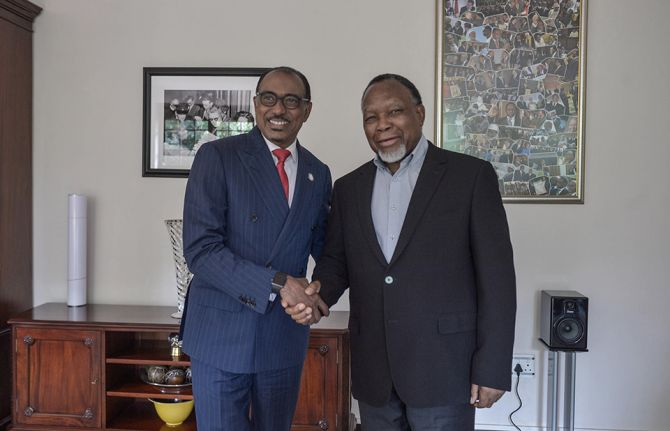 Keeping up the momentum in the global AIDS response
Keeping up the momentum in the global AIDS response

24 April 2019
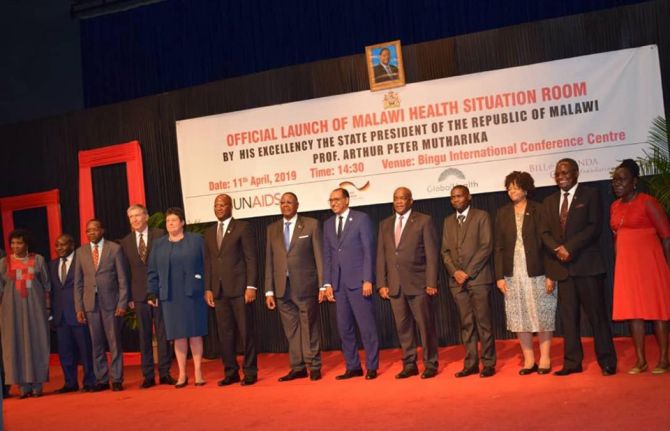 Malawi launches its health situation room
Malawi launches its health situation room

12 April 2019
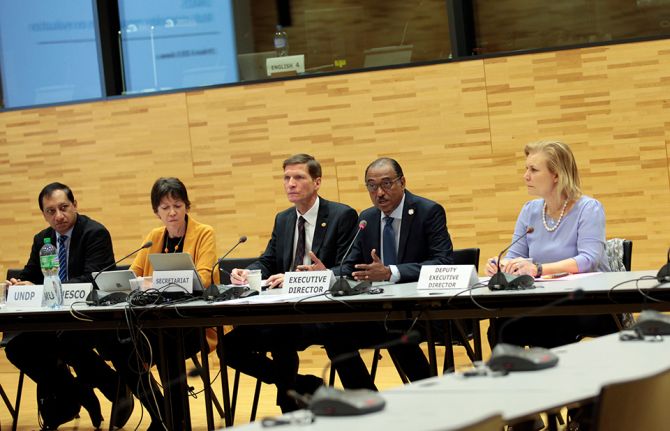 Learning lessons on evaluation
Learning lessons on evaluation

02 April 2019

Feature Story
AIDS Ambassadors gather in Indonesia
09 August 2009
09 August 2009 09 August 2009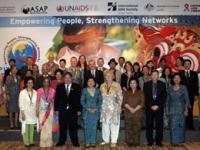 The AIDS Ambassadors discussed ways in which to strengthen their roles to contribute to the achievement of the Millennium Development Goals. Credit: UNAIDS/Donang Wahyu
The AIDS Ambassadors discussed ways in which to strengthen their roles to contribute to the achievement of the Millennium Development Goals. Credit: UNAIDS/Donang WahyuAhead of the official opening ceremony of the 9 th International Congress on AIDS in Asia and the Pacific (ICAAP), a high-level meeting of AIDS Ambassadors took place in Bali. The gathering was co-hosted by the First Lady and National AIDS Ambassador of Indonesia, Mrs Ani Bambang Yudhoyono, and AIDS Ambassador of Australia, Mr Murray Proctor.
The AIDS Ambassadors meeting addressed the need for leadership in the Asia and Pacific Region and the ways in which Ambassadors can have a greater effect in reducing the spread and impact of HIV.
The AIDS Ambassadors discussed ways in which to strengthen their roles to contribute to the achievement of the Millennium Development Goals. They also discussed ways to address challenges, including better donor coordination, programs to address gender power imbalances, promoting an agenda for youth and recognition of the development impacts of the epidemic.
The UN Secretary-General’s Special Envoy for HIV/AIDS in Asia and the Pacific Dr Nafis Sadik also participated in the event together with, among others, the First Lady of Cambodia, Madame Bun Rany Hun Sen, Lady Roslyn Morauta, AIDS Ambassador and Former First Lady of Papua New Guinea , the AIDS Ambassador from the Netherlands, Dr Wijnroks, UNAIDS Director, Regional Support Team for Asia and the Pacific, Mr JVR Prasada Rao, UNFPA Deputy Executive Director, Purnima Mane and UNAIDS Goodwill Ambassador Salman Ahmed whom participated in the dialogue as an advocate for youth, emphasizing the role they can play in leading HIV prevention efforts.

The high-level meeting of AIDS Ambassadors was co-hosted by the First Lady and National AIDS Ambassador of Indonesia, Mrs Ani Bambang Yudhoyono (in the image), and AIDS Ambassador of Australia, Mr Murray Proctor. Credit: UNAIDS/Donang Wahyu
In order to translate their commitment to reducing the spread and impact of HIV into action, delegates endorsed a joint statement that was then delivered by Indonesia’s First Lady, H.E. Ibu Ani Bambang Yudhoyono at the 9th ICAAP Opening Ceremony.
In the statement, AIDS Ambassadors called on Governments, donor organizations and all community partners to support and maintain HIV programmes with the goal in mind of reaching universal access to comprehensive prevention, care, support and treatment for as well as sustaining progress in implementing the Declaration of Commitment adopted at the UN General Assembly Special Session on AIDS in 2001, despite the pressures of the global economic crisis.
HIV epidemic in Asia and Pacific
According to the Independent Commission on AIDS in Asia (2008), AIDS remains the most likely cause of death and loss of work days among people aged 15 to 44.
An estimated 5 million people in Asia were living with HIV in 2007 according to 2008 report on the global AIDS epidemic. The several modes of HIV transmission present in the region, via sex work, injecting drug use, and unprotected sex between men; make Asia’s epidemic one of the most diverse in the world. The Pacific region’s epidemics are relatively small with an estimated 74 000 people living with HIV across Oceania in 2007.
AIDS Ambassadors gather in Indonesia
Related links:
ICAAP 2009
Asia
Oceania
Dr Nafis Sadik UN Secretary-General’s Special Envoy for AIDS in Asia and in the Pacific
Speeches:
External links:
Publications:
2008 Report on the global AIDS epidemic
Joint action for results: UNAIDS outcome framework, 2009 – 2011 (pdf, 396 Kb.).
Report of the Commission on AIDS in Asia: Redefining AIDS in Asia: Crafting an effective response (pdf, 1.6 Mb)

Feature Story
UNAIDS Cosponsors out in force for 9th ICAAP
09 August 2009
09 August 2009 09 August 2009
The 10 UNAIDS Cosponsors are presenting a strong showing as thousands of delegates converge in Bali, Indonesia, to share ideas, knowledge, best practices, lessons learned and research findings at the 9th International Congress on AIDS in Asia and the Pacific (ICAAP).
The Cosponsors are an integral part of the UN’s response to the global AIDS epidemic and UNAIDS brings together their efforts and resources.
Echoing the Congress theme, ‘Empowering people - strengthening networks’, the Cosponsors are organising and presenting symposia, skills-building workshops and satellite meetings drawing together a number of participants from a range of disciplines with the aim of helping to build and nurture partnerships to bolster the AIDS response in the region.
A number of events are joint Cosponsor initiatives. For example, the Symposium on ‘HIV prevention and most at risk young people’, taking place on 10 August, is sponsored by UNFPA, UNICEF, UNESCO, UNDP, WHO and UNAIDS. The symposium, hosted by the Asia Pacific Regional UN Coordination Group on Most at Risk Young People, is designed to look at the specific needs of this population which is, in general, not being reached by HIV prevention services. This includes injecting drug users, men who have sex with men and sex workers and their clients. Representatives from these groups will also take part in the panel discussion –one further example of how Cosponsor ICAAP activities are designed to involve key populations.
Other examples of Cosponsor activities include UNDP, ILO and UNAIDS (with the Joint United Nations Initiative on Mobility and HIV/AIDS in South East Asia) collaborating on a joint symposium on 12 August entitled, ‘The Impact of the Financial Crisis on Labour Migration and HIV’ in which they will bring their respective expertise to bear on this pressing international issue. UNHCR, along with UNAIDS, is hosting a satellite session on 12 August called ‘Opportunities and challenges in addressing HIV amongst diverse humanitarian populations’. WFP will use a satellite session on 11 August to explore the vital role of nutrition and food security for people living with HIV and will, along with its partners, look at ‘Models for integrating nutrition and food security into HIV care, support and treatment in the Asia Region: Opportunities and challenges’.
The World Bank is also championing the screening, on 10 August, of the film, Suee (Needle) by Cannes Film Festival award winner, Sai Paranjpye, which deals with the lives of injecting drug users and the anti-AIDS stigma they face. The film emerged from the South Asia Region Development Marketplace, a grant programme spearheaded by the Bank and supported by a range of partners including UNAIDS, UNICEF, UNODC and UNDP.
There is an extremely broad range of other Cosponsor activities taking place over the five days of the Congress and a number of these events will be highlighted on the UNAIDS website as the ICAAP progresses.
UNAIDS and its ten Cosponsors work to provide technical support to countries to assist them in the implementation of their national AIDS plans. A ‘division of labour’ guides the technical support provided to enhance coordination, avoid duplication and provide the best assistance available. Each of the Cosponsor organizations leads in at least one technical area. These organizations are:
Office of the United Nations High Commissioner for Refugees (UNHCR)
United Nations Children's Fund (UNICEF)
United Nations Development Programme (UNDP)
United Nations Population Fund (UNFPA)
United Nations Office on Drugs and Crime (UNODC)
International Labour Organization (ILO)
United Nations Educational, Scientific and Cultural Organization (UNESCO)

Feature Story
A new blog for the development community: Conversations for a Better World
06 August 2009
06 August 2009 06 August 2009A new shared blog for the development community
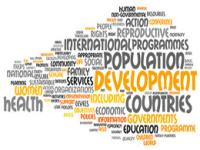
The burning issues in the world today demand discussions among the whole UN family and the development community. This is why the UNFPA, the United Nations Population Fund, is launching a series called Conversations for a Better World. It is based on the idea that if the AIDS epidemic and other key development issues are to be dealt with effectively, greater attention has to be paid to population dynamics and reproductive health. The idea is to activate informed discussion and debate.
We know that many visitors to the UNAIDS website are very knowledgeable about AIDS and poverty, and we encourage them to register and share their opinions and insights. That’s what ‘Conversations’ is all about.
Neil Ford, chief of the Media and Communications Branch of UNFPA
Conversations for a Better World is a shared blog, where people can express and exchange ideas and opinions on development issues. Each month the blog will have an editorial focus on one major topic.
“Poverty and AIDS: What really drives the epidemic?” is the conversation topic that launches 6 August and includes various opinion pieces and blog-posts related to the complicated relationship between lack of access to resources and HIV. The previous conversation topic was “Women and the Economic Crisis.”
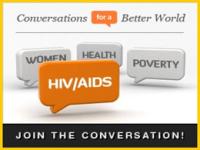
Conversations for a Better World is based on ‘the power of we’: the idea that when it comes to addressing complex challenges, collective wisdom is called for. Anyone can contribute by uploading personal stories, relevant photos or videos and comments or opinion pieces.
“We’re hoping to engage discussion from experts as well as people who are directly impacted by these issues,” said Neil Ford, chief of the Media and Communications Branch of UNFPA. “We know that many visitors to the UNAIDS website are very knowledgeable about AIDS and poverty, and we encourage them to register and share their opinions and insights. That’s what ‘Conversations’ is all about.”
- Not afraid to be provocative, subsequent Conversation topics will pose a number of questions over the coming year. These will include:
- September 2009: Young People and Times of Change: Talking about life, love and sexuality
- October 2009: Motherhood and Human Rights: Do all pregnant women have the right to live?
- November 2009: Population Dynamics and Climate Change: Who’s at the centre of the storm?
- December 2009: Sexual Violence and Progress: What are the real costs?
- January 2010: Women and Hunger: Who feeds the family, and how?
- February 2010: Migration and Prosperity: What’s fair?
You are invited to share your opinion. Start by going to www.conversationsforabetterworld.com Then, feel free to register and join the conversation!
A new blog for the development community: Convers
Cosponsors:
Feature stories:
UNFPA: Bringing HIV services directly to communities in Côte d'Ivoire (21 April 2008)
External links:
Conversations for a Better World
Contact:
Alvaro Serrano,
serrano@unfpa.org
Ida Jeng Christensen,
ichristensen@unfpa.org
Publications:
Sexual & reproductive health and HIV linkages: Evidence review and recommendations (2009) (pdf, 785 Kb.)
Gateways to integration: Case study from Haiti. To raise awareness of the pressing need for more widespread linkages between sexual and reproductive health and HIV (2008) (pdf, 562.7 Kb.)

Feature Story
Preventing HIV through education in Latin America and Caribbean
31 July 2009
31 July 2009 31 July 2009
Ministers of Education and Health in Latin America and the Caribbean and other officials during the First Meeting of Ministers of Health and Education to stop HIV/AIDS in Latin America and the Caribbean. Mexico City, 1 August 2008.
Photo credit: agencialibrefoto
A year ago Latin America and the Caribbean Ministers pledged to provide comprehensive sex education in schools. The historic Prevention through education declaration was signed at the end of the First Meeting of Ministers of Education and Health to prevent HIV in Latin America and the Caribbean.
The Ministers committed to promoting concrete actions for HIV prevention among young people in their countries by implementing sex education and sexual health promotion programmes.
Effective sexuality education can provide young people with age-appropriate, accurate and sensitive information equipping them to make informed decisions. Governments in Latin America and Caribbean are showing increasing leadership in this area.
Dr César Nunez, UNAIDS Regional Director for Latin America
The declaration noted that “Sexuality is an essential part of being human and it is expressed throughout ones lifetime. Childhood and adolescence are important periods for the development of people and their countries, and for this reason, it is necessary to provide quality education that includes comprehensive education on sexuality both as a human right, as well as one that contributes to present and future quality of life.”
The Ministers also committed to two specific targets:
- By the year 2015, we will have reduced by 75% the number of schools that do not provide comprehensive sexuality education, of schools administered by the Ministries of Education.
- By the year 2015, we will reduce by 50% the number of adolescents and young people who are not covered by health services that appropriately attend to their sexual and reproductive health needs.
The 1 August meeting took place in Mexico City and was co-hosted by Dr José Ángel Córdova Villalobos (México), Minister of Health and Lic. Josefina Vázquez Mota (Mexico), Minister of Public Education in collaboration with Canciller Patricia Espinosa Cantellano (México), Minister of Foreign Affairs.
The event led to renewed commitment to education to prevent HIV in both Latin America and the Caribbean regions. Thanks to the declaration a new agreement was signed earlier this year in San Jose by the Government of Costa Rica which will lead in the sharing of sexual health information among young people, aged 15 – 25 years in two provinces. The young leaders will provide education on a wide range of issues such as modes of HIV transmission and how to use a condom.
Dr César Nunez, UNAIDS Regional Director for Latin America, points out that young people aged 15-24 accounted for 45% of all new HIV infections in 2007, however only 40% of young people aged 15-24 had accurate knowledge about HIV and transmission.
“Effective sexuality education can provide young people with age-appropriate, accurate and sensitive information equipping them to make informed decisions. Governments in Latin America and Caribbean are showing increasing leadership in this area.”
Preventing HIV through education in Latin America
Feature stories:
Costa Rica: Peer HIV prevention programmes to be promoted for young people (03 March 2009)
Leaders pledge to promote sexual health to stop HIV in Latin America and the Caribbean (03 August 2008)
Publications:
Ministerial Declaration: Preventing through education (en | es) (pdf, 112 Kb.| 91.5 Kb.)
Impact of HIV and sexual health education on sexual behaviour of young people: a review update (UNAIDS) (pdf, 736 Kb.)
Preventing HIV/AIDS in young People: A systematic review of the evidence from developing countries UNAIDS Inter-agency Task Team on Young People (UNAIDS Inter-agency Task Team on Young People, 2006) (pdf, 2.54 Mb.)

